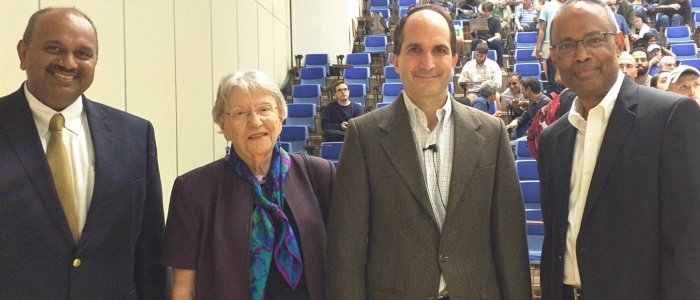Juan Maldacena of the Institute for Advanced Study has been named the 2018 recipient of the Richard E. Prange Prize and Lectureship in Condensed Matter Theory and Related Areas. Dr. Maldacena will receive a $10,000 honorarium. He delivered a public lecture entitled "Black Holes and the Structure of Spacetime” at the University of Maryland, College Park on October 2, 2018, and also gave a Condensed Matter Theory Center/Joint Quantum Institute seminar entitled “Wormholes and Entangled States” on Monday, October 1.
The Prange Prize, established by the UMD Department of Physics and Condensed Matter Theory Center (CMTC), honors the late Professor Richard E. Prange, whose distinguished professorial career at Maryland spanned four decades (1961-2000). The Prange Prize is made possible by a gift from Dr. Prange's wife, Dr. Madeleine Joullié, a professor of chemistry at the University of Pennsylvania.
Maldacena received his Ph.D. in 1996 at Princeton University, focusing on black holes in string theory. Just a few years later, he received a MacArthur Fellowship and tenure at Harvard University. He studies quantum gravity, string theory, quantum field theory and quantum entanglement. Among his honors are the Albert Einstein Medal, the Lorentz Medal, the Fundamental Physics Prize, the Dirac Prize and Medal, the Dannie Heineman Prize for Mathematical Physics, the Sackler Prize, a Packard Fellowship and a Sloan Fellowship. He is a member of the National Academy of Sciences.
Maldacena is most known for his 1997 solo theoretical discovery of a deep connection between gauge theories, which describe the world of particle physics at the microscopic scale, and quantum gravity, which describes the physics of gravitational forces holding the universe together. This famous Maldacena gauge-gravity (or AdS/CFT) duality, arguably the most important theoretical physics result of the last 30 years, has remained a topic of great fundamental interest in particle physics, string theory, gravity, nuclear physics, and condensed matter physics, and is one of the most actively-studied topics in theoretical physics. In particular, Maldacena conjectured that certain strongly-interacting quantum field theories are equivalent to certain weakly-interacting theories of gravity, leading to new insights in all of physics. This work of Maldacena, receiving in excess of 10,000 citations, is among the most cited papers in all of science over the last 20 years.
Maldacena’s Prange Prize lecture was given in Room 1412 of UMD’s John S. Toll Physics Building at 4:00 p.m. on Tuesday, October 2.
At the University of Chicago, Richard Prange received his Ph.D. under Nobelist Yoichiro Nambu and also worked with Murray Gell-Mann and Marvin Goldberger. At the University of Maryland, he edited a highly-respected book on the quantum Hall effect and made important theoretical contributions to the subject. His interests extended into all aspects of theoretical physics, and continued after his retirement. Dr. Prange was a member of the Maryland condensed matter theory group for more than 40 years and was an affiliate of CMTC since its inception in 2002.
"Richard enjoyed a fascinating and fulfilling career at the University of Maryland exploring condensed matter physics, and even after retirement was active in the department," said Dr. Joullié. "He spent the very last afternoon of his life in the lecture hall for a colloquium on graphene, followed by a vigorous discussion. And so I was happy to institute the Prange Prize, to generate its own robust discussions in condensed matter theory."
"The Prange Prize provides a unique opportunity to acknowledge transformative work in condensed matter theory, a field that has proven to be an inexhaustible source of insights and discoveries in both fundamental and applied physics,” said Dr. Sankar Das Sarma, who holds the Richard E. Prange Chair in Physics at UMD and is also a Distinguished University Professor and director of the CMTC.
Since its initiation in 2009, the Prange Prize has been awarded to Philip W. Anderson, Walter Kohn, Daniel Tsui, Andre Geim, David Gross, Klaus von Klitzing, and Frank Wilczek.






